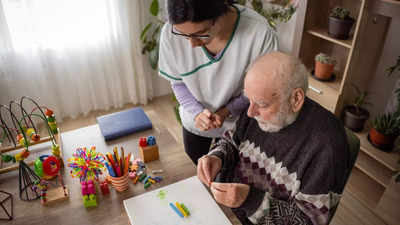Amidst the ever-evolving circumstances of healthcare, art and
music therapy
have revolutionized
geriatric care
, offering a profound way to nurture senior’s mental and emotional well-being. These therapies ignite creativity, enrich cognitive health, and provide solace, weaving a deeply holistic, human-centered approach into the fabric of
elderly care
.
The science behind art and music therapy
Art and music therapy have helped improve the emotional well-being of elderly persons, often relieving symptoms of depression and anxiety.
Art therapy
allows seniors to express themselves and artistically and wordlessly mirror their feelings and experiences. These therapies target portions of the brain that remain responsive even in neurodegenerative conditions. For example, the auditory cortex stays responsive to music stimuli that can suddenly recall memories and feelings otherwise suppressed or forgotten.
Emotional and psychological benefits
These therapies give purpose to life. Making art or listening to music gives elderly people a concrete product, be it a painting or a tune, that lends them a sense of accomplishment and counters feelings of helplessness that come with old age. Benefits include:
1. Alleviates isolation and depression: Art and music therapy provide seniors with a creative outlet, reducing feelings of loneliness and despondency.
2. Reduces anxiety: Engaging in these therapies helps ease anxiety, especially in patients with dementia or other cognitive impairments.
3. Boosts self-esteem and confidence: Creating art or music gives elderly individuals a sense of accomplishment, fostering self-worth and combating feelings of helplessness.
4. Promotes emotional expression: These therapies offer a non-verbal way to express emotions, helping seniors process complex feelings they may struggle to articulate.
5. Fosters a sense of purpose: Regular participation in artistic activities gives elderly individuals something to look forward to, enhancing their sense of purpose and fulfillment.
A complementary approach to geriatric care
Though conventional medical interventions are important in geriatric care, art and music therapy offer a pivotal complementary paradigm. These therapies promote creativity and emotional expression, which many forget to attend with age. Whether it is the soothing melodic rhythm or the simple act of touching when doing art, these therapies give an aging senior a sense of purpose and fulfillment in life and significantly enhance their quality of life.
Enhancing social interaction and cognitive function
Art and music therapy is mostly provided as a group activity, therefore, it encourages elderly patients to be more active. Social interaction, one of the key aspects of healthy aging, is supported with such cooperative therapies.
Music therapy has also been proven to be effective for bringing the patients out from linguistic issues who are the recovered patients from stroke or are suffering with Alzheimer’s. Art therapy, on the other hand, can enhance the motor skills, coordination, and even concentration of seniors while working on some form of fine arts, which could either be drawing or sculpting.
To put it simply, integrating art and music therapy into geriatric care isn’t a luxury, it’s essential. By nurturing the emotional, social, and cognitive well-being of seniors, these therapies offer a holistic approach to aging, creating not just longer lives but richer, more fulfilling ones.
Authored by: Dr. Meenal Thakral (Classified Specialist- Geriatric Medicine, Artemis Hospitals)
Why do fit people have heart attack
